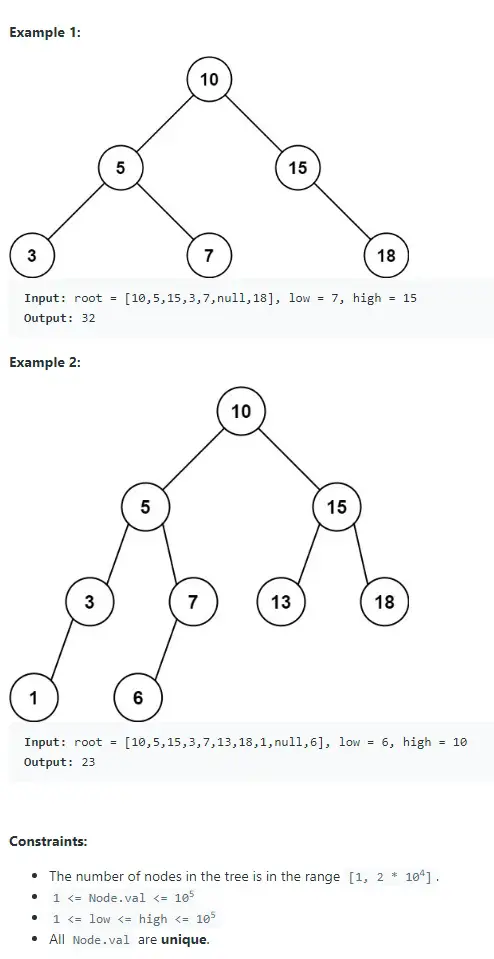Given the root node of a binary search tree, return the sum of values of all nodes with value between L and R (inclusive).
The binary search tree is guaranteed to have unique values.
Example 1:
Input: root = [10,5,15,3,7,null,18], L = 7, R = 15
Output: 32Example 2:
Input: root = [10,5,15,3,7,13,18,1,null,6], L = 6, R = 10
Output: 23Note:
The number of nodes in the tree is at most 10000.
The final answer is guaranteed to be less than 2^31.
Given a BST, we can bruteforce the nodes using Depth First Search, Breadth First Search, and any tree traversal approaches e.g. pre-order, post-order or in-order.
However, as the binary tree is BST, if the current node is smaller than the lower bound, we don’t need to traverse its left tree, and similarly, if the node is larger than the upper bound, we don’t need to check its right tree.
Iterative Algorithm of Computing Range Sum in BST
Let’s create a stack and push the root node if not empty. We update the sum if the current node is within the given range, and push the left and/or right node to the stack if it makes sense.
1 2 3 4 5 6 7 8 9 10 11 12 13 14 15 16 17 18 19 20 21 22 23 24 25 26 27 28 29 30 31 32 33 34 | /** * Definition for a binary tree node. * struct TreeNode { * int val; * TreeNode *left; * TreeNode *right; * TreeNode(int x) : val(x), left(NULL), right(NULL) {} * }; */ class Solution { public: int rangeSumBST(TreeNode* root, int L, int R) { int ans = 0; stack<TreeNode*> st; if (root == NULL) return 0; st.push(root); while (st.size() > 0) { // !st.empty() auto p = st.top(); st.pop(); if (p != NULL) { if (p->val >= L && p->val <= R) { ans += p->val; // update the sum } if (L < p->val) { st.push(p->left); // push left tree } if (p->val < R) { st.push(p->right); // push the right tree } } } return ans; } }; |
/**
* Definition for a binary tree node.
* struct TreeNode {
* int val;
* TreeNode *left;
* TreeNode *right;
* TreeNode(int x) : val(x), left(NULL), right(NULL) {}
* };
*/
class Solution {
public:
int rangeSumBST(TreeNode* root, int L, int R) {
int ans = 0;
stack<TreeNode*> st;
if (root == NULL) return 0;
st.push(root);
while (st.size() > 0) { // !st.empty()
auto p = st.top();
st.pop();
if (p != NULL) {
if (p->val >= L && p->val <= R) {
ans += p->val; // update the sum
}
if (L < p->val) {
st.push(p->left); // push left tree
}
if (p->val < R) {
st.push(p->right); // push the right tree
}
}
}
return ans;
}
};For tree problems, most have O(N) time complexity and space complexity where N is the number of the nodes in a tree.
Recursion of Computing Range Sum in BST
The same idea can be implemented using recursion where the stack can be maintained automatically by the compiler.
1 2 3 4 5 6 7 8 9 10 11 12 13 14 15 16 17 18 19 20 21 22 23 24 25 26 27 28 29 30 31 32 33 | /** * Definition for a binary tree node. * struct TreeNode { * int val; * TreeNode *left; * TreeNode *right; * TreeNode(int x) : val(x), left(NULL), right(NULL) {} * }; */ class Solution { public: int rangeSumBST(TreeNode* root, int L, int R) { ans = 0; dfs(root, L, R); return ans; } private: void dfs(TreeNode* root, int L, int R) { if (root == NULL) return; if (root->val >= L && root->val <= R) { ans += root->val; // update the sum } if (root->val >= L) { // search the left tree dfs(root->left, L, R); } if (root->val <= R) { // search the right tree dfs(root->right, L, R); } } int ans; }; |
/**
* Definition for a binary tree node.
* struct TreeNode {
* int val;
* TreeNode *left;
* TreeNode *right;
* TreeNode(int x) : val(x), left(NULL), right(NULL) {}
* };
*/
class Solution {
public:
int rangeSumBST(TreeNode* root, int L, int R) {
ans = 0;
dfs(root, L, R);
return ans;
}
private:
void dfs(TreeNode* root, int L, int R) {
if (root == NULL) return;
if (root->val >= L && root->val <= R) {
ans += root->val; // update the sum
}
if (root->val >= L) { // search the left tree
dfs(root->left, L, R);
}
if (root->val <= R) { // search the right tree
dfs(root->right, L, R);
}
}
int ans;
};The BST tree allows up to check if the node has been fallen in the range, and avoid searching outside the boundary – which speeds up the process.
See also other implementations of the Range Sum of BST in other programming languages:
– Teaching Kids Programming – Algorithms to Compute the Range Sum of a Binary Search Tree
– How to Sum within A Range in a Binary Search Tree?
– GoLang: Algorithm to Compute the Range Sum of a Binary Search Tree
–EOF (The Ultimate Computing & Technology Blog) —
loading...
Last Post: Magik Says Happy Valentines by Drawing a Heart to Console
Next Post: How to Solve the Lemonade Change Problem by Simulation Algorithm?
